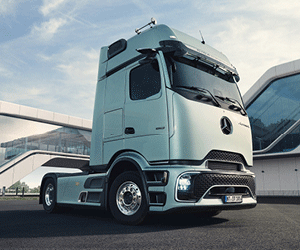Fleet security is a critical concern for the UK’s logistics and transport industry. There are obvious road transport crimeslike the safeguarding of vehicles, cargo and personnel. But it goes deeper than this, enhanced fleet security is essential for the smooth operation of the entire logistics chain.
This is even more relevant in today’s world where the rapid evolution of technologies like AI and the Internet of Things (IoT) is introducing new opportunities and challenges in equal measure.
This article looks at these technologies and more, we also discuss some best practices that can get them working for you and not against you.
Advanced Technologies in Fleet Security
There are only a few occasions where technology can lay a true claim to the term disruptive. While the long-awaited arrival of the self-driving vehicle will inevitably become such a technology, its day is not yet with us.
However, some of the companion tech is already making truly disruptive noises of their own. Advancements in AI, telematics, and the increasing incorporation of GPS tracking are all offering unprecedented levels of oversight and control:
- AI-powered surveillance systems: Advanced business security cameras provide enhanced monitoring capabilities, using algorithms to detect unusual patterns or behaviours that might indicate security breaches.
- GPS tracking and geofencing: Essential for real-time location tracking, these technologies help in monitoring vehicle movements and ensuring they stay within predefined geographical boundaries.
- Telematics and fleet monitoring software: Offering a comprehensive view of fleet operations, these tools assist in managing vehicle security, health, driver behaviour, and operational efficiency.
- Cybersecurity measures for fleet data: As fleets become more connected, protecting data from cyber threats is crucial. Robust cybersecurity protocols are necessary to safeguard sensitive information.
The security of a vehicle fleet is not just about protecting assets. For fleet managers, integrating the latest technologies can result in optimised operations and reduced overheads.
Best Practices in Fleet Security
Simply throwing technology at a problem and hoping it fixes it rarely works. To get the most out of the latest generation of security technologies takes a logical approach both in terms of implementation and ongoing efficiency.
Here are some key best practices that can significantly improve fleet security:
- Regular security audits and updates: Regularly reviewing and updating security measures keeps the fleet protected against evolving threats. This includes assessing physical security, software updates, and employee training programs.
- Comprehensive staff training: Ensuring that all staff, from drivers to fleet managers, are well-trained in security protocols is crucial. This includes understanding how to use security technologies, awareness of potential threats, and how to respond in emergency situations.
- Effective communication and incident response plans: Having clear communication channels and well-defined incident response plans ensures quick and coordinated action in case of security breaches or emergencies.
- Integrating security with overall fleet management: Security should be a seamless part of overall fleet management, including maintenance schedules, driver performance monitoring, and vehicle tracking.
- Monitoring all critical areas, including charging points for EVs: As fleets increasingly enjoy the benefits of workplace EV chargers, securing charging points becomes essential. Surveillance and monitoring of these areas prevent unauthorised access and vandalism.
These guidelines allow fleet managers to implement and maintain systems that not only enhance fleet security but also contribute to improved operational efficiency and driver safety.
Future Developments in Fleet Security
Predicting the future is never easy, however, let’s get the crystal ball out and give it a shot. This isn’t a pointless exercise, by staying informed of emerging technologies and trends, fleet managers can continue to use the latest technology to protect their vehicles and operational efficiencies.
- Autonomous vehicle technology: The eventual integration of self-driving vehicles into fleets promises to reshape fleet management, offering enhanced safety features and operational efficiencies.
- Advanced AI and machine learning: These technologies are expected to become more sophisticated, providing even deeper insights into predictive analytics for fleet maintenance and security, one way this technology is already manifesting itself is with AI distraction cameras.
- Increased use of IoT devices: The Internet of Things will continue to expand within fleet operations, offering more interconnected data points for comprehensive monitoring and management.
- Blockchain for enhanced security and transparency: Blockchain technology could revolutionise how fleet data is stored and shared, offering a new level of security and transparency in operations.
We all know that fleet management is challenging. However, by staying ahead of the game, fleet managers can ensure that they are well-positioned to meet the security and logistical challenges of today and tomorrow.
A Fleeting Glimpse Into How Technology is Transforming Fleet Security
The rapid evolution of technology is changing how we secure our fleets at a pace that is more rapid than at any time in recent history. From AI-enhanced surveillance to advanced data analytics, these innovations are not just enhancing security but also streamlining operations. For fleet managers, staying abreast of these changes is key to navigating the challenges and opportunities of the future.







